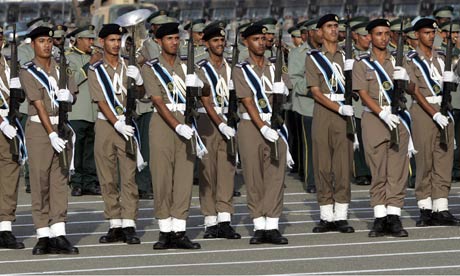We won’t trouble Saudi’s tyrants with calls to reform while we crave their oil
![]()
Unrest will be seen as destabilising for western governments too until our dependency on Riyadh’s tap is curbed
George Monbiot

Saudi Arabian troops in Mecca before the intervention in Bahrain, where the US fifth fleet is based. Photograph: Ali Haider/EPA
Did you hear it? The clamour from western governments for democracy in Saudi Arabia? The howls of outrage from the White House and No 10 about the shootings on Thursday, the suppression of protests on Friday, the arrival of Saudi troops in Bahrain on Monday? No? Nor did I.
Did we miss it, or do they believe that change is less necessary in Saudi Arabia than it is in Libya? If so, on what grounds? The democracy index published by the Economist Intelligence Unit places Libya 158th out of 167, and Saudi Arabia 160th. At least in Libya, for all the cruelties of that regime, women are not officially treated as lepers were in medieval Europe.
Last week, while explaining why protests in the kingdom is unnecessary, the foreign minister, Prince Saud Al-Faisal, charmingly promised to “cut off the fingers of those who try to interfere in our internal matters”. In other parts of the world this threat would have been figurative; he probably meant it. If mass protests have not yet materialised in Saudi Arabia, it’s because the monarchy maintains a regime of terror, enforced with the help of torture, mutilation and execution.
Yet our leaders are even more at ease among the Saudi autocracy than they were in the court of Colonel Gaddafi. The number of export licences granted by the UK government for arms sales to the kingdom has risen roughly fourfold since 2003. The last government was so determined to preserve its special relationship with the Saudi despots that it derailed British justice by forcing the Serious Fraud Office to drop its inquiry into corruption in the al-Yamamah deals.
Why? Future weapons sales doubtless play a role. But there’s an even stronger imperative. A few days ago the French bank Société Générale warned that unrest in Saudi Arabia could push the oil price to $200 a barrel.
Abdullah’s kingdom is the world’s last “swing producer”: the only nation capable of raising crude oil production if it falls elsewhere, or if demand outstrips supply. As a result, political disruption there is as threatening to the stability of western governments as it is to the Saudi regime. Probably more so, as our leaders wouldn’t get away with gunning us down in the street.
Few governments of nominal democracies are likely to survive the economic dislocation that a sustained price of $200 would deliver: like Brian Cowen, they would be out on their butts quicker than you could cycle past a petrol station. You’re as likely to hear David Cameron call for the overthrow of the House of Saud as you are to hear King Abdullah call for the overthrow of the House of Lords.
But even if the regime remains unchallenged, it’s not clear that it can keep delivering. The WikiLeaks cables showed American diplomats questioning the kingdom’s ability to keep raising production. One cable suggested that its reserves have been overstated by 40%. If so, that wouldn’t be surprising. The production quotas assigned to Opec states are a function of the size of their stated reserves: all members of the cartel have an incentive to exaggerate them. Saudi Arabia posts the same figure as it did in 1988. Fact or fiction, who knows? The true condition of its oil fields is a state secret.
Another cable questioned the Saudi ability to keep moving the market. “Clearly they can drive prices up, but we question whether they any longer have the power to drive prices down for a prolonged period.”
Western governments rely for their production forecasts primarily on the International Energy Agency. It has recently had to retreat on both its forecasts of future supply and its mocking dismissal of those who have warned that global oil output may one day peak. In 2006 the IEA predicted that world oil supply would rise from 82m barrels a day to 116m in 2030. In 2008 it reduced the forecast to 106m, in 2009 to 105m and in 2010 to 96m (by 2035).
It might have to be downgraded again. The IEA’s new prediction relies on an assumption that Saudi output will rise from 9m barrels to 14.6m in 2035. The embassy cables report the alleged opinions of Dr Sadad al-Husseini, the former head of exploration and production at Saudi Aramco. “Sustaining 12 million barrels [per] day output will only be possible for a limited period of time, and even then, only with a massive investment program.” Once Saudi Arabia has produced 180bn barrels (in about 2021) “a slow but steady output decline will ensue and no amount of effort will be able to stop it”. When the US embassy cables were released, Al-Husseini denied that he said this. But the figures in the report are detailed and precise.
Unlike the last British government, the coalition does at least admit that there might be a problem. Chris Huhne, the energy secretary, argues that “getting off the oil hook is made all the more urgent by the crisis in the Middle East. We cannot afford to go on relying on such a volatile source of energy”. Partly to this end he has published a new carbon plan. Some of the commitments, particularly on electricity and home heating, are better than might have been expected.
But the plan’s weakest point is transport, where it offers incentives without regulation. Huhne’s response to the oil crisis will save plenty of coal and gas, but precious little oil.
That’s not surprising when you see who else sits at the cabinet table. A fortnight ago, as the oil price was soaring, Philip Hammond, the transport secretary, proposed raising – yes, raising – the motorway speed limit from 70 to 80mph. George Osborne, the chancellor, has hinted that he will drop the planned rise in fuel duty in next week’s budget. I can understand why he wants to dampen prices but it could also be argued that when supply is tightest, fuel duty should be highest. The government also plans to introduce what it calls a “fair fuel stabiliser”. This policy might be blessed with the best abbreviation since the proposed City University of Newcastle-on-Tyne was rechristened, but it’s likely to ensure that demand remains strong. There is, as yet, no government programme that will sharply reduce our craving for oil.
Oil dependency means dependency on Saudi Arabia. Dependency on Saudi Arabia means empowerment of its despotic monarchy. Forget, if you must, the trifling issue of climate breakdown. Forget the incidental matter of economic depression. An oil-dependent economy means an impregnable tyranny in Saudi Arabia. That alone should prompt us to rethink the way we travel.
guardian.co.uk/georgemonbiot
Related Articles
Gunfights in Lebanon amid simmering tension
![]()
Army vows firm action to curb violence following deaths in the wake of intelligence chief’s assassination Lebanon’s army says Lebanon
“El posneoliberalismo en América Latina pasa por consolidar una alianza de fuerzas sociales que construya nuevas formas de poder popular”
![]()
El científico social brasileño Emir Sader, secretario ejecutivo de CLACSO,durante el diálogo que sostuvo con el director del Observatorio Sociopolítico
Idlib Will be the Final Test of Turkish-Russian Cooperation in Syria
![]()
With Turkey preparing the rebels in Idlib to repel the impending offensive by the Syrian Arab Army it seems likely that this will be the end of Turkish-Russian cooperation in Syria



